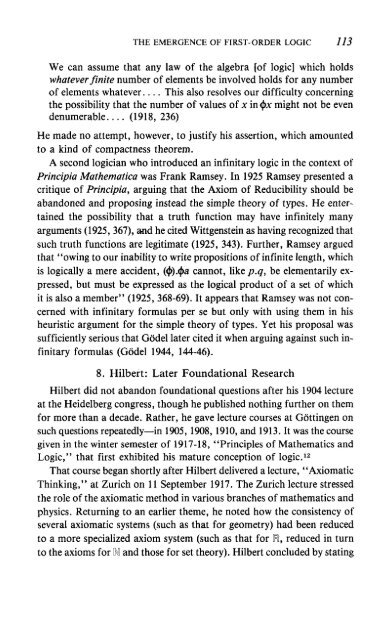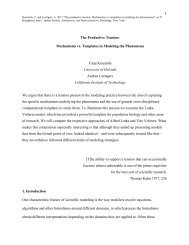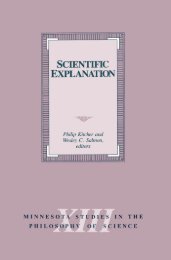The Emergence of First-Order Logic
The Emergence of First-Order Logic
The Emergence of First-Order Logic
Create successful ePaper yourself
Turn your PDF publications into a flip-book with our unique Google optimized e-Paper software.
THE EMERGENCE OF FIRST-ORDER LOGIC 113<br />
We can assume that any law <strong>of</strong> the algebra [<strong>of</strong> logic] which holds<br />
whatever finite number <strong>of</strong> elements be involved holds for any number<br />
<strong>of</strong> elements whatever.... This also resolves our difficulty concerning<br />
the possibility that the number <strong>of</strong> values <strong>of</strong> x in x might not be even<br />
denumerable.... (1918, 236)<br />
He made no attempt, however, to justify his assertion, which amounted<br />
to a kind <strong>of</strong> compactness theorem.<br />
A second logician who introduced an infinitary logic in the context <strong>of</strong><br />
Principia Mathematica was Frank Ramsey. In 1925 Ramsey presented a<br />
critique <strong>of</strong> Principia, arguing that the Axiom <strong>of</strong> Reducibility should be<br />
abandoned and proposing instead the simple theory <strong>of</strong> types. He entertained<br />
the possibility that a truth function may have infinitely many<br />
arguments (1925, 367), and he cited Wittgenstein as having recognized that<br />
such truth functions are legitimate (1925, 343). Further, Ramsey argued<br />
that "owing to our inability to write propositions <strong>of</strong> infinite length, which<br />
is logically a mere accident, ().a cannot, like p.q, be elementarily expressed,<br />
but must be expressed as the logical product <strong>of</strong> a set <strong>of</strong> which<br />
it is also a member" (1925, 368-69). It appears that Ramsey was not concerned<br />
with infinitary formulas per se but only with using them in his<br />
heuristic argument for the simple theory <strong>of</strong> types. Yet his proposal was<br />
sufficiently serious that Godel later cited it when arguing against such infinitary<br />
formulas (Godel 1944, 144-46).<br />
8. Hilbert: Later Foundational Research<br />
Hilbert did not abandon foundational questions after his 1904 lecture<br />
at the Heidelberg congress, though he published nothing further on them<br />
for more than a decade. Rather, he gave lecture courses at Gottingen on<br />
such questions repeatedly—in 1905, 1908, 1910, and 1913. It was the course<br />
given in the winter semester <strong>of</strong> 1917-18, "Principles <strong>of</strong> Mathematics and<br />
<strong>Logic</strong>," that first exhibited his mature conception <strong>of</strong> logic. 12<br />
That course began shortly after Hilbert delivered a lecture, "Axiomatic<br />
Thinking," at Zurich on 11 September 1917. <strong>The</strong> Zurich lecture stressed<br />
the role <strong>of</strong> the axiomatic method in various branches <strong>of</strong> mathematics and<br />
physics. Returning to an earlier theme, he noted how the consistency <strong>of</strong><br />
several axiomatic systems (such as that for geometry) had been reduced<br />
to a more specialized axiom system (such as that for H, reduced in turn<br />
to the axioms for 1M and those for set theory). Hilbert concluded by stating




